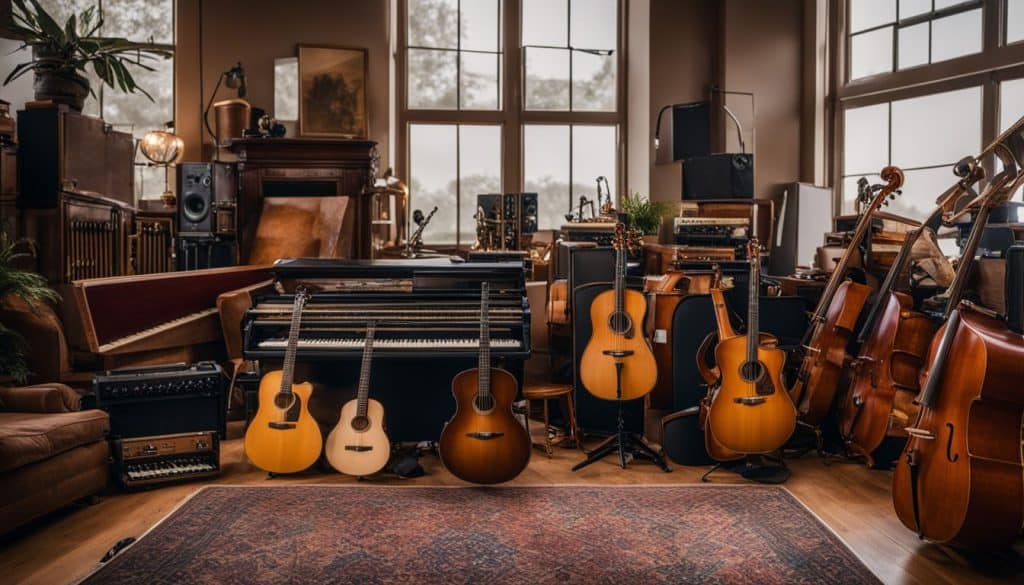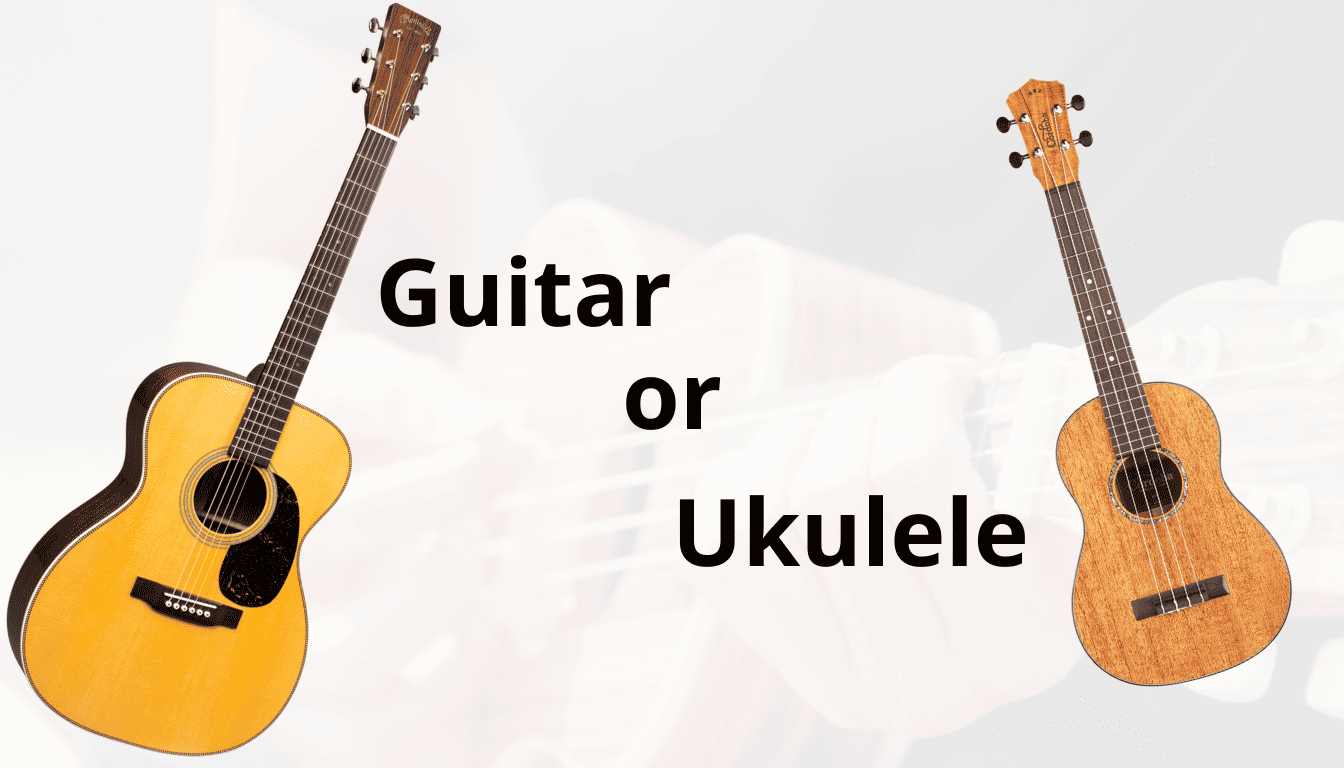Is It Better To Learn Guitar Or Ukulele First? Choosing between learning the guitar or ukulele first can be a tough decision for many beginners. Both instruments have their unique appeal and challenges, but the ukulele is often seen as a more beginner-friendly choice.
Let’s weigh up the pros and cons of starting your musical journey with either of these popular string instruments. Ready to strum into action? Let’s dive in!
Key Takeaways
- The ukulele can be easier for beginners due to fewer strings and simpler chords.
- Learning the guitar first provides a greater challenge and broadens musical skills.
- Both instruments offer transferable skills; what you learn on one, can apply to the other.
- Choosing an instrument depends on personal goals, budget, inspiration, playability and commitment level.
The Ukulele vs. The Guitar: A Basic Overview

Whether you’re choosing between a ukulele or a guitar, understanding the basic contrasts between them is essential.
| Ukulele | Guitar | |
|---|---|---|
| Complexity | Ukuleles are less complex than guitars, with fewer strings and simpler chord structures. | Guitars offer more complexity, which can be a greater challenge for learners. |
| Cost | When it comes to budget, ukuleles are generally less expensive than guitars. | Guitars tend to be pricier options compared to ukuleles. |
| Finger Pain | Ukuleles provide a more gentle experience on the fingers, causing less pain compared to guitars. | Guitars, especially when learning, can cause finger pain due to the pressure required on the strings. |
| Learning Curve | Ukuleles have a quicker, more enjoyable learning process. This ease can encourage consistency in practice. | Guitars have a steeper initial learning curve, which might be intimidating for beginners. |
| Transference of Skill | The skills acquired from playing the ukulele can easily transfer to the guitar. | Learning the guitar first can offer skills that are transferable to other string instruments. |
It’s clear that both instruments have their own unique advantages and complexities. Your choice ultimately lies in what you seek to achieve musically and what you’re ready to handle as a learner.
Benefits of Learning the Ukulele First

The ukulele offers a fun, less intimidating start for beginners. Its smaller size and gentler nylon strings spare newbies the finger pain often associated with learning guitar. Notably, the skills you acquire from playing the ukulele transfer smoothly to the guitar later, making your transition easier.
Plus, who can resist the quick satisfaction of strumming out simple songs early in their musical journey? All these make starting with a ukulele a favorable choice for many first-time string instrument learners.
Quick and Enjoyable Learning Process
Ukuleles are known for offering a quick and enjoyable learning process, especially for beginners. Their small size and simpler fretting demands often lead to the fun faster as you can pick up basic chords in no time.
The intriguing voice of a ukulele, coupled with its gentle nylon strings, also contributes positively to the overall learning experience.
In contrast to the steep initial learning curve associated with guitars, the less complex structure of ukuleles makes it more forgiving to early learners, which drives commitment of time into practice without worry or pressure.
Consequently, playing becomes enjoyable rather quickly, even for complete novices!
Less Intimidating for Beginners
Ukuleles present a less daunting challenge to the inexperienced musician. Their small size and unique voice intrigue people, making them more approachable from the get-go. The ukulele’s price is often lower than that of a guitar, reducing stress over a larger investment.
With only four strings, compared to six on most guitars, fretting and playing styles become easier to grasp for beginners. Finger discomfort usually associated with learning string instruments becomes much less due to lighter tension on ukulele strings crafted from gentler materials such as nylon and Nylgut/Nyltech.
Simplicity in mastering basic chords makes the transition into playing songs faster, which instills encouragement right away. With quiet and calming uke sounds, mistakes become less noticeable, fostering greater confidence in practice sessions for beginner players.
Skills Easily Transfer to Guitar
Learning the ukulele first provides a convenient platform to master guitar skills. The relative position of notes on the fretboard and hand techniques like hammer-ons, pull-offs, and strumming patterns are common between both instruments.
Such shared traits enhance finger dexterity and reduce learning time when transitioning from the ukulele to the guitar. Moreover, this acquired knowledge builds a solid foundation for musical understanding that proves beneficial while learning guitar or any other string instrument in the future.
Therefore, starting with a ukulele can successfully pave the way to becoming an adept guitar player!
Gentle on the Fingers
Ukuleles prove gentle on the fingers, a boon for beginners and lifelong ukulele and guitar players alike. Nylon strings of ukuleles induce less finger pain compared to steel strings used in guitars, reducing the likelihood of sore fingertips.
This factor makes practicing consistently less intimidating and more enjoyable for fret folks, newbies, or those with arthritic fingers. The smaller size of a ukulele reveals shorter scale lengths, leading to less stretching and limiting hand cramping during play, especially when hitting barre chords.
Playing becomes enjoyable faster; light calluses start to form while minimizing finger discomfort, even during hours-long practice sessions or performance settings. Not only does this aspect encourage smoother chord changes and strumming, but it also allows budding musicians to focus more on making music rather than dealing with persistent discomfort.
Benefits of Starting with the Guitar

Starting with the guitar can present a more substantial challenge to beginners due to its complexity. The wider range of musical options that guitars offer allows room for skill expansion and variety.
Furthermore, skills learned on the guitar can be easily transferred to other string instruments, broadening your musical proficiency.
More Complexity, Greater Challenge
Learning the guitar presents a unique set of trials that can sharpen your musical skills considerably. The six strings and long neck demand precise finger placements to execute chords correctly, magnifying the complexity and challenge for beginners.
Yet, this complexity is not without merit; it adds depth to your music-learning journey and broadens your repertoire of skills. Navigating the larger body and longer scale lengths may seem daunting initially, but mastering these complexities builds substantial finger dexterity and muscle memory over time.
A wider Range of Musical Options
Choosing the guitar first can broaden your musical horizons. With six strings as compared to the ukulele’s four, and a wider variety of notes and scales, you are not limited in your choice of genres or styles.
You can dive into anything from rock to blues to folk, creating complex pieces that captivate audiences. The guitar’s versatility allows for bending notes, sliding between frets, and playing intricate fingerstyle pieces with fluency.
Learning how to navigate this expansive range enhances both your technical skills and musical creativity. Moreover, the option of coupling a guitar with an amplifier paves the way for more dynamic performance settings—be it strumming around a campfire or performing on grand stages.
Skills Transferable to Other String Instruments
Starting to learn the guitar with prior ukulele experience proves beneficial, as many skills transfer easily. Notably, finger dexterity and fretting notes on a ukulele apply directly to playing the guitar.
You’ll notice that the relative position of notes on both instruments’ fretboards is similar, making it easy for you to find your way around. More so, familiar hand techniques such as hammer-ons and pull-offs from your ukulele practice can be utilized when strumming on a guitar.
If you’re looking for an easier transition from one string instrument to another, starting with a baritone ukulele serves as an excellent stepping stone towards mastering the guitar! This approach also helps in training your ear for note recognition during guitar play.
Undoubtedly, learning either of these instruments enriches your musical journey by providing useful skills applicable across different platforms.
Factors to Consider When Choosing an Instrument

Deciding on your first instrument involves considering various factors. Assess your budget, as it determines the quality of the ukulele or guitar you can afford. Consider what inspires you musically and which instrument aligns with that inspiration.
Evaluate the playability; nylon strings on a ukulele may be gentler for beginner’s fingers compared to steel guitar strings. Remember that learning any instrument demands time and consistent practice, so consider your commitment level.
Reflect on your musical goals—do they involve strumming chords, playing fingerstyle pieces, or performing in front of others? Keep in mind different instruments excel at different music genres, making it essential to understand where your interest lies before finalizing an instrument.
Your Budget
Your budget plays a crucial role in deciding whether to start with the ukulele or guitar. Ukuleles are generally less expensive, making them an excellent choice if you’re on a tight budget.
Starter ukuleles and guitars vary widely in price, but you’ll likely find that even a quality instrument for beginners is more affordable in the ukulele range. However, be aware that playing becomes enjoyable only when your instrument isn’t holding you back; thus investing well initially might steer clear of potential finger pain and discomfort due to substandard instruments.
The lifelong ukulele and guitar player journey begins with your investment of money as much as it does with your commitment of time.
Your Musical Goals
Your musical goals play a pivotal role in deciding the right instrument for you. If your dream is to strum along with popular songs on a guitar, starting directly with it might sound like an excellent choice.
However, if you are intrigued by the unique tones of a ukulele and wish to create soothing melodies, it would be best to embark on your musical journey with a ukulele. Either way, always remember that learning one does not exclude the other! Both skills complement each other well, regardless of which string instrument you pick up first.
The Learning Curve
The learning curve for playing a ukulele is generally less steep than that of a guitar. Ukuleles come with fewer and softer strings, making them less daunting and physically challenging for beginners.
The gentler strings also lessen finger discomfort, reducing the chances of sore fingertips or hand cramps. In contrast, guitars deliver greater complexity, which may be intriguing to some but can also pose a challenge in the early stages of learning.
This complexity translates to more notes to master on the fretboard and tougher steel strings that require stronger finger pressure. However, powering through this initial difficulty paves the way for developing advanced skills like smooth chord changes and fingerstyle pieces faster than one would on a ukulele.
Final Thoughts: What Instrument is Best for You?

Your choice between learning the guitar or the ukulele first hinges on your personal preferences and goals. If faster enjoyment, less finger pain, and lower cost appeal to you, consider starting with a ukulele.
However, if you relish a more serious challenge right from the start that spans across various music genres, then delve into mastering the guitar first; it might be just right for you.
Conclusion: Is It Better To Learn Guitar Or Ukulele First?
In deciding whether to learn the ukulele or guitar first it largely depends on your personal goals and preferences. Both instruments offer unique advantages for beginners. The ukulele provides a less intimidating start and quicker gratification, while the guitar tasks you with a bigger challenge that expands musical possibilities.
Remember, no choice is absolute -you can always switch or learn both!
FAQs
Is it easier to start learning on a ukulele or guitar?
Both the ukulele and guitar have their own learning curves, and the ease of learning can vary depending on the individual. However, generally speaking, the ukulele is often considered easier to start learning compared to the guitar. The ukulele has fewer strings and a smaller body, making it physically easier to handle for beginners. Additionally, the ukulele has a simpler chord structure and requires less finger stretching, which can make it more accessible for those new to string instruments.
Does the note range differ between the ukulele and the guitar?
Yes, the note range differs between the ukulele and the guitar. The ukulele is typically tuned to G-C-E-A, while the guitar is typically tuned to E-A-D-G-B-E. This difference in tuning results in a different range of notes that can be played on each instrument.
What are some benefits of starting with a ukulele?
Some benefits of starting with a ukulele include:
1. Easy to learn: The ukulele has a simple and beginner-friendly design, making it easier for beginners to start playing music quickly.
2. Portable: Ukuleles are compact and lightweight, making them convenient to carry around and play on the go.
3. Affordable: Compared to many other musical instruments, ukuleles are relatively inexpensive, making them a cost-effective option for beginners.
4. Versatile: The ukulele can be used to play a wide range of music genres, from pop and folk to jazz and rock.
5. Build foundational skills: Learning to play the ukulele can help develop important musical skills such as rhythm, melody, and finger coordination.
6. Social instrument: The ukulele is often associated with group playing and sing-alongs, making it a great instrument for social gatherings and community events.
7. Boosts confidence: Mastering songs on the ukulele and performing in front of others can boost self-confidence and provide a sense of accomplishment.
8. Gateway to other instruments: Learning to play the ukulele can serve as a stepping stone to learning other string instruments, such as the guitar.
Remember to practice regularly and seek guidance from tutorials or instructors to make the most of your ukulele learning journey.
Can you learn music reading on both Guitar and Ukulele?
Yes, you can learn music reading on both instruments. With patience and practice, you can learn to read music and notations like tabs, slides, and fingerstyle plucking patterns on both these instruments, although mistakes may be less noticeable on small-sized ukes.
How do budgets for starter Guitars or Ukuleles compare in case I am messing around before deciding which is best for me?
Generally speaking, a starter guitar could cost more than an average-priced soprano or concert uke but less than a higher-end tenor or baritone ukulele. The budget factor should be considered along with personal motivation when picking your first instrument.

